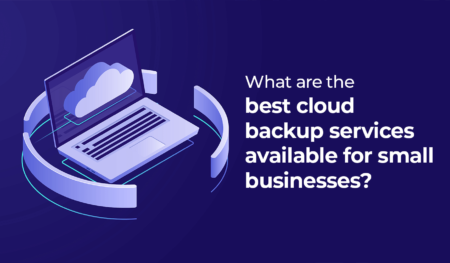
For small businesses, cloud computing services should be affordable, easy to use, and scalable as the business grows. Here are the best cloud computing services tailored for small businesses:
1. Google Cloud Platform (GCP)
- Pros:
- Simple and scalable pricing with free tier options.
- Excellent tools for collaboration, especially with Google Workspace (Docs, Drive, Gmail).
- Offers tools for data analytics and AI, which can grow with your business needs.
- Cons:
- Smaller ecosystem compared to AWS, but still very capable for most small business needs.
Best for: Businesses looking for collaboration tools and scalability, especially if using Google’s suite of applications.
2. Amazon Web Services (AWS)
- Pros:
- Highly scalable and offers a wide range of services (including free tier for small usage).
- Pay-as-you-go pricing model, meaning you only pay for what you use.
- AWS Lightsail is a simple cloud hosting solution for small businesses and startups.
- Cons:
- Pricing can get complicated and more expensive as you scale.
- Can be overwhelming with the number of services available for small businesses.
Best for: Businesses that need a wide variety of tools and services, or plan to scale quickly.
3. Microsoft Azure
- Pros:
- Seamless integration with Microsoft Office products and Windows.
- Offers good hybrid cloud solutions (if your business has some on-premise IT needs).
- Azure has a small business pricing structure and various free-tier services.
- Cons:
- Pricing can become complex.
- Some services may require technical expertise to set up initially.
Best for: Businesses already using Microsoft products like Office 365 or Windows-based systems.
4. DigitalOcean
- Pros:
- Simple, transparent, and affordable pricing.
- User-friendly dashboard and straightforward features make it easy for beginners.
- Ideal for small websites, app hosting, and simple cloud storage.
- Cons:
- Fewer advanced features compared to AWS or Azure.
- Not as robust for large-scale or complex applications.
Best for: Small businesses or startups looking for affordable, simple cloud services without too much complexity.
5. Linode
- Pros:
- Developer-friendly and highly affordable.
- Straightforward, no-nonsense pricing, perfect for smaller budgets.
- Offers powerful VPS hosting solutions that can easily support small businesses.
- Cons:
- Fewer data centers compared to larger providers.
- Limited advanced services (e.g., AI, machine learning).
Best for: Startups or small businesses that need a cost-effective solution with strong performance.
6. Vultr
- Pros:
- Simple pricing, affordable plans, and good performance for smaller projects.
- Suitable for web hosting, databases, and small business applications.
- Easy-to-use dashboard and quick deployment of virtual machines.
- Cons:
- Limited features for larger enterprise needs.
- Less global infrastructure compared to AWS, Azure, or Google Cloud.
Best for: Small businesses needing reliable cloud hosting or web-based applications.
7. Zoho Cloud (Zoho Workplace)
- Pros:
- All-in-one business cloud suite (email, document editing, CRM, project management).
- Affordable pricing and designed specifically for small businesses.
- Easy integration with other Zoho products and third-party tools.
- Cons:
- Not as customizable or flexible as larger cloud providers.
- Limited infrastructure options for larger, more complex needs.
Best for: Small businesses that want a full suite of productivity tools along with basic cloud infrastructure.
8. Backblaze B2 Cloud Storage
- Pros:
- Very affordable cloud storage solution.
- Ideal for small businesses that need a simple, reliable backup and storage system.
- Easy to integrate with other apps and services for data backup.
- Cons:
- Not a full-featured cloud platform (focused only on storage).
- Lacks the wide range of services offered by major cloud providers.
Best for: Small businesses focused on cloud storage and backup solutions.
9. Hostinger Cloud
- Pros:
- Affordable and easy-to-use cloud hosting for websites.
- Simple setup for small businesses and e-commerce sites.
- Reliable uptime and fast performance for websites.
- Cons:
- Focused on hosting, not a full cloud platform.
- Limited flexibility compared to bigger cloud platforms like AWS or Azure.
Best for: Small businesses or e-commerce stores that need affordable and reliable web hosting.
10. Alibaba Cloud
- Pros:
- Competitive pricing, especially in regions like Asia.
- Offers a variety of services that are great for small businesses, including affordable compute and storage options.
- Good customer support.
- Cons:
- Fewer global data centers compared to AWS, GCP, or Azure.
- Limited presence and services in regions outside Asia.
Best for: Small businesses targeting customers in Asia or looking for affordable cloud solutions in that region.
Factors to Consider for Small Businesses:
- Ease of Use: Choose platforms like DigitalOcean, Google Cloud, or Vultr for ease of setup.
- Affordability: For smaller budgets, Linode, DigitalOcean, or Zoho Cloud offer simple pricing.
- Scalability: AWS, GCP, or Azure provide long-term scalability as your business grows.
- Integration: Choose platforms that integrate well with your existing tools (e.g., Microsoft Azure for Office 365 users).
